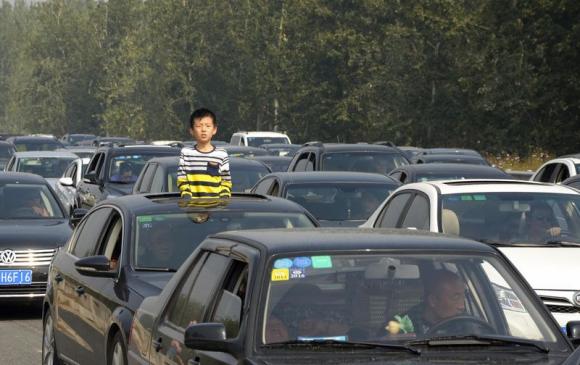(Reuters) - China said on Thursday it would punish carmakers by restricting their production and publicly naming them if they fail to meet fuel consumption requirements on passenger vehicles set for 2015.
周四,中国称将会通过限制生产和公开名称来惩罚那些截止到2015年仍未达到客车燃料消耗要求的汽车制造商。

Punitive measures outlined for offenders of the already- announced fuel economy rules reflect Bei jing's latest effort to fight pollution and promote more efficient use of energy.
这些针对不遵守能源经济法规的人的惩罚措施反映了北京为打击污染和提高能源利用率所做的最新努力。
They are also likely to push auto makers, both foreign and Chinese, to embrace more cutting- edge technology such as gaso line- electric hybrids and all- electric cars.
也进一步促进国外国内的汽车制造商发展例如油电混合电力车和全电力驱动车的前沿科技。
China's fuel economy rules, as stringent as those to be enforced in the United States, Europe and Japan, involve a fleet- wide corporate average target of 6.9 litres per 100km in 2015 and 5.0 litres in 2020. They take effect on Nov. 1.
中国的能源经济法规和美国欧洲日本的一样严格,包括到公司燃料消耗平均目标2015年为止每100公里6.9公升,到2020年为止为5公升。法规将于11月1号起生效。
China said on Thursday it would publicly name carmakers who fail to meet the 2015 target and would ban the production of new models that do not meet fuel economy targets, to be determined by a special weight- based formula.
中国周四说道,对于那些截止到2015年仍未达到燃料消耗要求的客车将会限制他们生产新型号。
The government will also reject expansion plans by offenders, who be required to submit improvement plans.
政府同样还会拒绝违规者扩大生产的计划,他们将被要求提交整改计划。
James Chao, director of I H S Automotive for the Asia- Pacific region, said the punitive measures for 2015 "may not matter in a practical sense", because most automakers, save for a few, are projected to be able to comply with the requirements.
IHS汽车调查公司亚太区的主管James Chao说这些2015年的惩罚措施“有可能实际上并没有效果”但是除了少数人之外,大部分的汽车制造商表达的意向还是会遵守规定的。
But if similarly tough punitive measures were to be enforced in connection with targets for 2020, "it could have a very significant effect, given that few (makers) ... are projected to be able to comply on a corporate average fuel efficiency basis," Chao said.
但是如果类似严苛的惩罚措施在2020年的时候仍被和目标联系起来并强制执行,“它有可能会导致很大的影响。让那些少数的(制造商)....在公司的平均燃料功率的基础上有同意的意向”Chao说。
The rules were published by five government agencies including the Ministry of Industry and Information Technology (M I I T).
包括中国工业和信息化部在内的五个政府机构联合发布了这项法规。
China has already taken a series of measures to fight pollution, including restricting car sales in major cities and providing incentives for selling electric vehicles. But the latest measures would put further pressure on carmakers.
中国已经采取了一系列措施打击治理污染。这些措施包括在大城市内限制汽车的销售,为销售电动汽车提供奖励。但是最新的出台的这一系列措施将会进一步给汽车制造商施压。
Last year, 85 car manufactures in China measured their corporate-average fuel consumption, and about 30 percent of them, mostly domestic brands, failed to meet their annual target for 2013, according to results published by M I I T earlier this year. No punishments were imposed at the time.
去年85家汽车制造商衡量了他们公司平均燃料消耗,约30%的制造商没能达到2013年的年度目标,这之中大部分是国内品牌。那时还没有惩罚措施。
The rules also apply to importers of foreign passenger vehicles. Last year, 13 importers of foreign brands, including General Motors Co (G M.N), Nissan Motor Co (7201.T), Porsche (PSHG_p. D E), Hyundai (005380.K S), failed to meet their annual target, partly reflecting the fact that most imports are bigger and more powerful models.
这些法规同样也适用于进口国外客车。去年13家进口外国品牌也没能达到年度目标。这之中包括通用汽车 (GM.N)、日产汽车 (7201.T)、保时捷(P S H G_p. D E)和现代(005380.KS)。这也部分反映出大部分进口的产品都是比较大型且更强大的型号。













